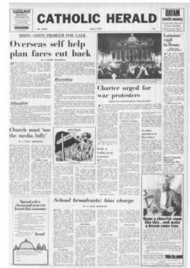Page 1, 4th June 1971
Page 1

Report an error
Noticed an error on this page?If you've noticed an error in this article please click here to report it.
Tags
Share
Related articles
Conscientious Objection May Become Legal In Italy
For Chariots, Read Cars
American Bishops Approve Conscientious Objection
Conscientious Objectors Get Support From British Bishops
Conscientious Objection
Charter urged for war protesters
FROM ALAN McELWAIN IN VATICAN CITY ALL countries should legally recognise conscientious objection an alternative form of service to the country which is not military," the working committee of the Pontifical Commission and Peace said this week.
There are various degrees of conscientious objection which "attack or question the ways of life and the institutions of certain societies," the committee says. It suggests there should be an international statute to deal with conscientious objection.
At its last meeting, the committee dealt with conscientious objection as a whole and in individual cases. It said there was a "whole gamut" of problems on which more research into the theological and philosophical implications would be useful.
It said the "right to development" and the "right to dissent" were important in a
Death of leading Jesuit ecumenist
ONE of the best known ecumenical scholars in Britain, Fr. Bernard Leeming, S.J., died last week in Carlisle at the age of 78 after a long illness.
A former professor of the Gregorian University, Rome, and Heythrop College, Oxfordshire, he was a close collaborator with the late Cardinal Augustine Bea. ST, the first head of the Vatican Secretariat for Christian Unity.
In this country Fr. Leeming was best known for his classic studies of the modern ecumenical movement, notably in his hook "The Churches and the Church" and his commentary on the Vatican Council's decree on Ecumenism. changing society. It also discussed "possible action to be taken to remedy situations in which human and collective rights are downtrodden."
EXPLICIT STATEMENT A spokesman said this was one of the Vatican's most explicit statements in favour of dissenters against civil authority. "The committee dealt in particular with the problem of conscientious objection as a whole and in individual cases.
"It was agreed that there was a need to further the legal recognition of conscientious objectors in all those countries without legal provisions and to offer an alternative form of service to the community which is not exclusively military."
The committee discussed "the possibility of an international statute on conscientious objection."
The committee also discussed cultural injustice — unfair educational handicaps for social and racial groups — and asked experts to prepare an indepth analysis to be discussed at a future meeting.
The committee has recommended the holding of an international meeting on racial discrimination to support the United Nations 1971 campaign against this.
"New relationships in the international community" are to be examined in the light of Pope Paul's recent Apostolic Letter on Social Justice, which was addressed to the president of the Pontifical Commission on Justice and Peace, Cardinal Maurice Roy, Archbishop of Quebec. The committee has also drawn up a future policy ,"based on questions related to the tangible needs of the men of today in all their suffering and all their hopes for liberation in the future."
The working committee met under the chairmanship of Mr. Vittorino Veronese, a civilian and former Director-General of UNESCO. Mgr. Bernard Lelande, National Representative of the French branch of Pax Christi, acted as secretary.
blog comments powered by Disqus









